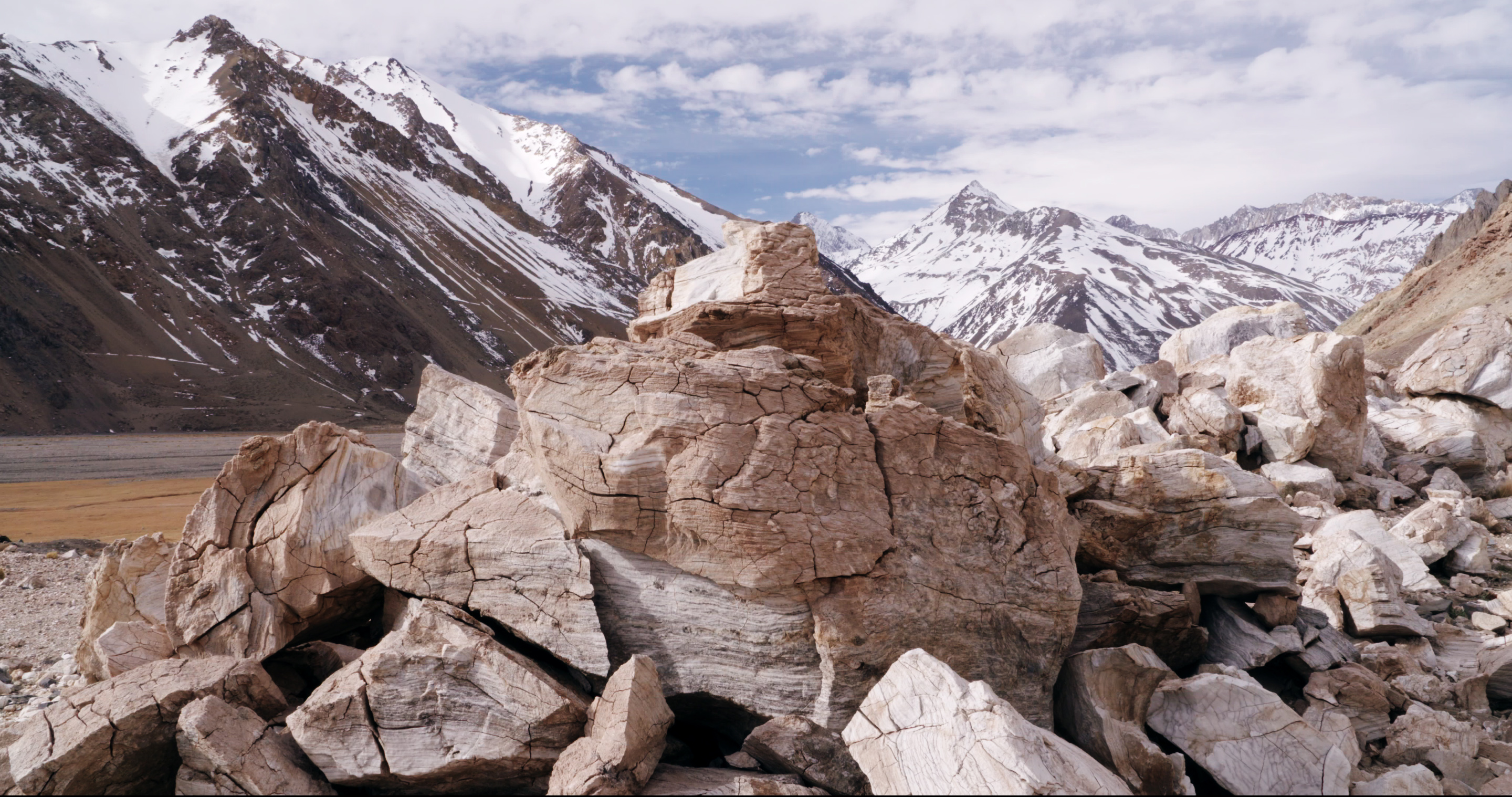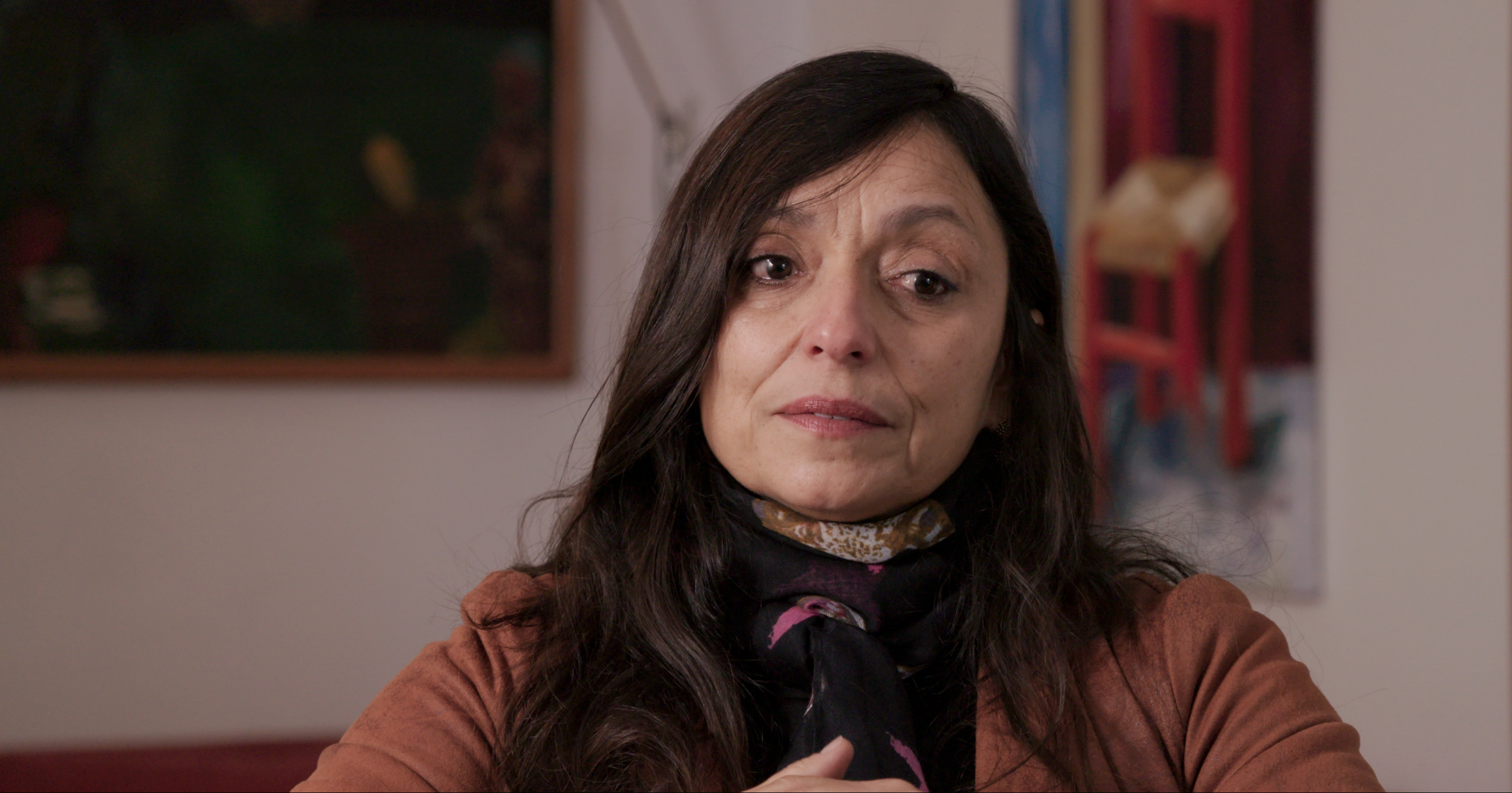The Cordillera of Dreams review - bardic reveries and brutal fascism | reviews, news & interviews
The Cordillera of Dreams review - bardic reveries and brutal fascism
The Cordillera of Dreams review - bardic reveries and brutal fascism
Patricio Guzmán uncovers more crimes buried in Chile's wondrous landscape

Santiago materialises through white clouds like a secret city, concealed by the elements. In this conclusion to Patricio Guzmán’s trilogy documenting the long nightmare of Chile’s coup through its landscape, the Cordillera – the country’s Andes spine – is an impassive, monumental witness to the Pinochet regime’s buried acts, and victims’ graveyard. The land, Guzmán suspects, can remember.
Guzmán endured mock executions then entered exile after Pinochet’s fatal, CIA-backed 1973 ousting of left-wing President Allende. In The Cordillera of Dreams and its predecessors, the boy lover of science-fiction favours metaphysical leaps and cosmic perspective over dry documentary, investigating geography and geology, memory and time. Attenborough-level nature footage combines with rigorous reportage and poetic incisions into cruelty and suffering. The crimes always take time to surface at the heart of these broader investigations, like the calcified toe of a “disappeared” corpse which shockingly pokes through Nostalgia for the Light’s southern desert, and The Pearl Button’s naked Indian corpse in a 19th century photo of Patagonian genocide.
 Pablo Salas’s ceiling-high archive of bravely videotaped, brutally suppressed protests is this film’s awful treasure. Filmed from the 1980s on, the hard swing and crack of truncheons, the boots into fallen bodies and the police impassively swivelling like fumigators to hose crowds are windingly real. From Iran to Russia right now, this is how it is. There’s a swaggering certainty to these brown-shirted goons, who mostly escaped even private guilt. Writer Jorge Baradit empathetically describes their mindset, believing left-wingers were “tumours” and “demons” in the civic body, so “making them explode, making them disappear”. Salas mourns his archive’s missing reel. “There’s no film of torture,” he notes. The regime’s ultimate essence stays unwitnessed by cinema.
Pablo Salas’s ceiling-high archive of bravely videotaped, brutally suppressed protests is this film’s awful treasure. Filmed from the 1980s on, the hard swing and crack of truncheons, the boots into fallen bodies and the police impassively swivelling like fumigators to hose crowds are windingly real. From Iran to Russia right now, this is how it is. There’s a swaggering certainty to these brown-shirted goons, who mostly escaped even private guilt. Writer Jorge Baradit empathetically describes their mindset, believing left-wingers were “tumours” and “demons” in the civic body, so “making them explode, making them disappear”. Salas mourns his archive’s missing reel. “There’s no film of torture,” he notes. The regime’s ultimate essence stays unwitnessed by cinema.
Compared to exiled Guzmán, Salas is the filmmaker who stayed. “This is where I’m from,” he says, words Guzmán perhaps leaves in as a rebuke to himself.
The left-wing intellectuals warmly able to discuss ideas again here (singer Javiera Parra pictured below) still feel they lost. Guzmán’s camera navigates neoliberal Santiago’s narrow glass and concrete canyons, while ghost trains traffic copper through nameless wasteland villages, and cobwebbed junkyards moulder. In the capital, inward-looking lives turn their back on the mountains, and the new society the young Guzmán worked for. The Chilean air he breathes isn’t the same now, time passing faster and slower too, warped by the coup and Cordillera.
 Guzmán the soft-spoken, enraptured narrator gives a sense of bardic reverie to these masterfully edited, lustrously beautiful films. The coup surely displaced him as a director, forcing engagement with lingering horrors. The trilogy recalls his childhood with an elegiac ache, “the innocence of Chile when I was a child” concluding Nostalgia for the Light. Here this idyll is another “country” he’s exiled from, provoking his most personal melancholy at “the loneliness that has stayed with me”, and “anxiety” after the coup wiped out his past. It’s as if Pinochet orphaned him.
Guzmán the soft-spoken, enraptured narrator gives a sense of bardic reverie to these masterfully edited, lustrously beautiful films. The coup surely displaced him as a director, forcing engagement with lingering horrors. The trilogy recalls his childhood with an elegiac ache, “the innocence of Chile when I was a child” concluding Nostalgia for the Light. Here this idyll is another “country” he’s exiled from, provoking his most personal melancholy at “the loneliness that has stayed with me”, and “anxiety” after the coup wiped out his past. It’s as if Pinochet orphaned him.
Guzmán is confessing the need behind his long, questing witness. His last wish is for Chile’s lost joy to return, for the innocence he imagines before 1973 to somehow be reclaimed. This confirms Guzmán’s lightly worn status as Chile’s national cinematic poet, remembering the disappeared, and the beloved, benighted country they disappeared into.
rating
Explore topics
Share this article
The future of Arts Journalism
You can stop theartsdesk.com closing!
We urgently need financing to survive. Our fundraising drive has thus far raised £49,000 but we need to reach £100,000 or we will be forced to close. Please contribute here: https://gofund.me/c3f6033d
And if you can forward this information to anyone who might assist, we’d be grateful.

Subscribe to theartsdesk.com
Thank you for continuing to read our work on theartsdesk.com. For unlimited access to every article in its entirety, including our archive of more than 15,000 pieces, we're asking for £5 per month or £40 per year. We feel it's a very good deal, and hope you do too.
To take a subscription now simply click here.
And if you're looking for that extra gift for a friend or family member, why not treat them to a theartsdesk.com gift subscription?
more Film
 The Perfect Neighbor, Netflix review - Florida found-footage documentary is a harrowing watch
Sundance winner chronicles a death that should have been prevented
The Perfect Neighbor, Netflix review - Florida found-footage documentary is a harrowing watch
Sundance winner chronicles a death that should have been prevented
 Blu-ray: Le Quai des Brumes
Love twinkles in the gloom of Marcel Carné’s fogbound French poetic realist classic
Blu-ray: Le Quai des Brumes
Love twinkles in the gloom of Marcel Carné’s fogbound French poetic realist classic
 Frankenstein review - the Prometheus of the charnel house
Guillermo del Toro is fitfully inspired, but often lost in long-held ambitions
Frankenstein review - the Prometheus of the charnel house
Guillermo del Toro is fitfully inspired, but often lost in long-held ambitions
 London Film Festival 2025 - a Korean masterclass in black comedy and a Camus classic effectively realised
New films from Park Chan-wook, Gianfranco Rosi, François Ozon, Ildikó Enyedi and more
London Film Festival 2025 - a Korean masterclass in black comedy and a Camus classic effectively realised
New films from Park Chan-wook, Gianfranco Rosi, François Ozon, Ildikó Enyedi and more
 After the Hunt review - muddled #MeToo provocation
Julia Roberts excels despite misfiring drama
After the Hunt review - muddled #MeToo provocation
Julia Roberts excels despite misfiring drama
 London Film Festival 2025 - Bradley Cooper channels John Bishop, the Boss goes to Nebraska, and a French pandemic
... not to mention Kristen Stewart's directing debut and a punchy prison drama
London Film Festival 2025 - Bradley Cooper channels John Bishop, the Boss goes to Nebraska, and a French pandemic
... not to mention Kristen Stewart's directing debut and a punchy prison drama
 Ballad of a Small Player review - Colin Farrell's all in as a gambler down on his luck
Conclave director Edward Berger swaps the Vatican for Asia's sin city
Ballad of a Small Player review - Colin Farrell's all in as a gambler down on his luck
Conclave director Edward Berger swaps the Vatican for Asia's sin city
 London Film Festival 2025 - from paranoia in Brazil and Iran, to light relief in New York and Tuscany
'Jay Kelly' disappoints, 'It Was Just an Accident' doesn't
London Film Festival 2025 - from paranoia in Brazil and Iran, to light relief in New York and Tuscany
'Jay Kelly' disappoints, 'It Was Just an Accident' doesn't
 Iron Ladies review - working-class heroines of the Miners' Strike
Documentary salutes the staunch women who fought Thatcher's pit closures
Iron Ladies review - working-class heroines of the Miners' Strike
Documentary salutes the staunch women who fought Thatcher's pit closures
 Blu-ray: The Man in the White Suit
Ealing Studios' prescient black comedy, as sharp as ever
Blu-ray: The Man in the White Suit
Ealing Studios' prescient black comedy, as sharp as ever
 The Woman in Cabin 10 review - Scandi noir meets Agatha Christie on a superyacht
Reason goes overboard on a seagoing mystery thriller
The Woman in Cabin 10 review - Scandi noir meets Agatha Christie on a superyacht
Reason goes overboard on a seagoing mystery thriller
 London Film Festival 2025 - crime, punishment, pop stars and shrinks
Daniel Craig investigates, Jodie Foster speaks French and Colin Farrell has a gambling habit
London Film Festival 2025 - crime, punishment, pop stars and shrinks
Daniel Craig investigates, Jodie Foster speaks French and Colin Farrell has a gambling habit

Add comment